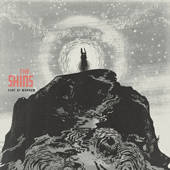
The Shins
Port of Morrow
(Columbia; 2012)
By Matt Main | 11 April 2012
There seems to be an earnest desire amongst many critics to predict what Port of Morrow, the Shins’ fourth record and first post-Dangermouse, might signify: “Is Port of Morrow their ‘experimental’ album?” “Can we justify describing this as the result of many years’ infighting and band member controversy?” The respective answers to which, I believe, are “no” and “not really”—I mean, I picture James Mercer firing a band member via a passive aggressive note before I do a profanity-laced slanging match—but, by the process of elimination those answers do throw up questions about what exactly there is left for the Shins to meaningfully attempt. To paraphrase CMG’s David Goldstein, “How can the Shins justify existing in 2012?”
Port of Morrow isn’t a lap of honor, though, nor a perfunctory byproduct of some hastily assembled reunion tour. Ever resolute, opening track “The Rifle’s Spiral” starts in a wholly different way than, say, “Sleeping Lessons” from Wincing the Night Away (2007)—an ominous crescendo versus a cyclical arpeggio. The effect is to immediately flick the album into motion, rather than a reflection on the effect of structure and texture on emotional feel, as Mercer once described his work on Wincing. Port of Morrow feels distinctly different to previous Shins albums because the lyricism is often more direct in approach, and on some occasions wavers from the usual harmony of tone between music and subject matter. This could, as it initially seems to in “No Way Down,” lead to the kind of unsubtle politicking that has been the downfall of many artists: “Out beyond the Western squalls / In an Indian land / They work for nothing at all / They don’t know the mall or the layaway plan.” In the context of “No Way Down”‘s summery, upbeat riff and careless unspooling it almost seems like sarcasm, a parody of both Mercer’s own, previously tight execution and the unchallenging nature of the Shins’ aesthetic, almost mocking how easy yet how ultimately unhelpful it is to make such statements.
It would be unfair to evaluate this album purely on the ambiguity of its faults, however, especially when they are few and far between. For every instance of wordy clumsiness there are many of worth: “Port of Morrow,” for instance, could almost be an OK Computer (1997) b-side with its embittered resignation and acidic implications for author and audience alike. Mercer, addressing the listener directly, speaks powerfully of our reactionary culture of trivialization—of reductively objectifying the huge atrocities of war into “postcards”; a game of “evil clowns”; something that we can click away by sharing videos with our friends. Perhaps more importantly, he also speaks powerfully of raptors.
This statement-led style is not the Shins as we know them. It’s important to remember that Mercer as the creative force was never young in this industry, but is now forty-one and two daughters deep into middle-age. If his vocals were a weak point before, now they are enriched by a new register of cynicism, applied to concepts of endless frustration like war and the slow-burning effects of globalization that only age can bring. It’s this new scale of resignation, held in opposition to his stirring demands of the audience, that illuminates songs like “For a Fool,” featuring the most achingly beautiful vocal line a Shins song has ever had, riding over the sound of jangle-pop guitars being deliberately laid to rest. That Mercer has matured both in approach and in vocal improvement is perhaps emphasized most by “September,” a track which, daubed in echoey coos and tethered only to the scratch of a güiro, could almost instrumentally sit on Oh, Inverted World (2001) or Chutes Too Narrow (2003), yet is carried with distinctive gusto by his voice.
Most likely, then, the answer to Dave’s question is simply that the Shins justify their existence through their ability to keep churning out innately relevant records—records which may not redefine indie music’s boundaries but are sufficiently able to surprise us time and time again with how much better James Mercer and co. can remould this formula for our enjoyment. In a way, it doesn’t matter that I think this may be the Shins’ best album to date, matching the track-by-track consistent superiority over most other ’00s pop albums of either their first two records and then going some, because, as Clay wrote back in 2007 when reviewing Wincing the Night Away, “this is a band that garners devotees, not fans.” And those devotees will recognize the glory of tracks like “40 Mark Strasse” and will know that Mercer has written the best song utilizing the cliché of nostalgia that he has yet written, and they will hear “September” and know it might just be his best track about the cliché of romance, and then they will measure Port of Morrow up themselves. They won’t care that it’s cliché, just that it’s the Shins, trying and perhaps failing to hit buttons they’ve never hit before, and still doing it better than almost everyone else. Clumsy it might be, familiar it might be; redundant it sure isn’t quite yet.





